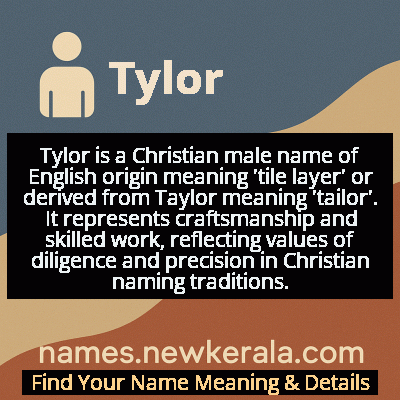Tylor Name Meaning & Details
Origin, Popularity, Numerology Analysis & Name Meaning of Tylor
Discover the origin, meaning, and cultural significance of the name TYLOR. Delve into its historical roots and explore the lasting impact it has had on communities and traditions.
Name
Tylor
Gender
Male
Origin
Christian
Lucky Number
9
Meaning of the Name - Tylor
Tylor is a Christian male name of English origin meaning 'tile layer' or derived from Taylor meaning 'tailor'. It represents craftsmanship and skilled work, reflecting values of diligence and precision in Christian naming traditions.
Tylor - Complete Numerology Analysis
Your Numerology Number
Based on Pythagorean Numerology System
Ruling Planet
Mars
Positive Nature
Generous, passionate, energetic, and humanitarian.
Negative Traits
Impulsive, impatient, moody, and can be overly emotional.
Lucky Colours
Red, maroon, scarlet.
Lucky Days
Tuesday.
Lucky Stones
Red coral, garnet.
Harmony Numbers
1, 2, 3, 6.
Best Suited Professions
Military, sports, philanthropy, leadership roles.
What People Like About You
Courage, energy, leadership, generosity.
Famous People Named Tylor
Tylor Megill
Professional Baseball Player
Major League Baseball pitcher for the New York Mets
Tylor Dory
Musician
Lead vocalist and guitarist for the Canadian progressive metal band Dory
Tylor Standley
Film Director
Award-winning director known for independent films and documentaries
Name Variations & International Equivalents
Click on blue names to explore their detailed meanings. Gray names with will be available soon.
Cultural & Historical Significance
Throughout English history, occupational names like Tylor represented social mobility and the growing importance of skilled trades in medieval and early modern economies. The name reflects the practical, industrious character often associated with English cultural identity. In Christian tradition, while not a biblical name, Tylor aligns with values of diligence and craftsmanship found in passages like Exodus 35:30-35, which celebrates divinely inspired artisans. The name's continued use demonstrates how occupational surnames have transitioned into personal names while retaining their historical connections to skilled work and reliability.
Extended Personality Analysis
Individuals named Tylor are often perceived as practical, hands-on problem-solvers with a strong work ethic. The name's occupational origins suggest someone who is meticulous, detail-oriented, and takes pride in craftsmanship—whether in professional pursuits or personal hobbies. They tend to be reliable and methodical, approaching challenges with patience and precision. Many Tylors exhibit a balanced combination of creativity and practicality, able to envision finished products while understanding the step-by-step process required to achieve them. Their communication style is typically straightforward and honest, valuing substance over flashiness.
In interpersonal relationships, Tylors are generally seen as steady and dependable rather than emotionally volatile. They often prefer demonstrating care through practical actions rather than elaborate expressions. This pragmatic approach can make them excellent partners in collaborative projects and reliable friends in times of need. While sometimes perceived as reserved initially, they typically form deep, lasting connections with those who appreciate their consistent nature and practical wisdom. Their problem-solving orientation means they're often the people others turn to when facing concrete challenges requiring systematic thinking and patient execution.
Modern Usage & Popularity
In contemporary naming practices, Tylor maintains a steady presence as a masculine given name, particularly in English-speaking countries like the United States, Canada, the United Kingdom, and Australia. While less common than the standard spelling 'Taylor', it appeals to parents seeking a familiar yet distinctive name that honors family naming traditions while providing individual identity. The name's popularity peaked in the 1990s alongside similar occupational names but has since stabilized at moderate usage levels. Current naming trends show Tylor being chosen by parents who appreciate its strong, traditional roots while preferring its slightly unique spelling variation. It typically ranks outside the top 200 names in most English-speaking countries, making it recognizable without being overly common or trendy.
Symbolic & Spiritual Meanings
Symbolically, Tylor represents craftsmanship, precision, and the transformation of raw materials into finished products. The name evokes the metaphor of building and creating—whether constructing physical objects, developing relationships, or building one's character. It suggests someone who pieces together elements to form coherent wholes, much like a tile layer creates patterns from individual pieces or a tailor assembles garments from fabric. This symbolism extends to personal growth, indicating someone who carefully constructs their life through deliberate choices and consistent effort. The name also carries connotations of reliability and service, as traditional tailors and craftsmen built their reputations through quality work and customer trust, making Tylor symbolic of dependability and mastery through dedicated practice.

